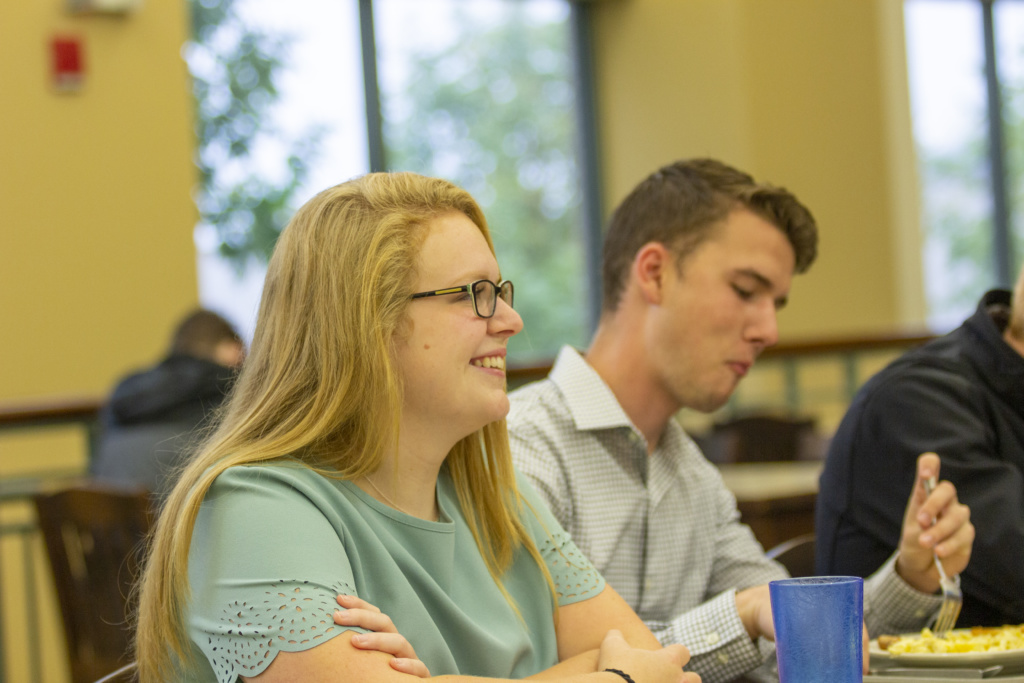MBU Hosts Greater Watertown Community Health Foundation at Business Breakfast Series
On September 11th, MBU hosted the Greater Watertown Community Health Foundation for a presentation about the value of soft skills in the workplace. Community business leaders and students attended the breakfast to learn the science behind the development of soft skills from childhood and strategies for teaching these skills to their adult employees.
 Tina Crave, President and CEO of GWCHF, began by showing the growing need for soft skills in the workplace by referencing an article from the Wall Street Journal entitled “Wanted: Employees who can shake hands, make small talk.” She pointed out that employers are looking for more than applicable degrees and specified job training, they are looking for the skills not taught in school. They are looking for employees that are trustworthy, driven, sociable, and dependable.
Tina Crave, President and CEO of GWCHF, began by showing the growing need for soft skills in the workplace by referencing an article from the Wall Street Journal entitled “Wanted: Employees who can shake hands, make small talk.” She pointed out that employers are looking for more than applicable degrees and specified job training, they are looking for the skills not taught in school. They are looking for employees that are trustworthy, driven, sociable, and dependable.
These attributes are commonly known as soft skills, and Miss Crave suggested the foundation for these skills is laid in the first five years of life. Crave introduced Kim Melcher, a Certified Health Education Specialist and GWCHF program officer. According to Melcher, new brain development research suggests a lack of developed soft skills in adults is linked to adverse childhood experiences, or ACEs.
Since 90% of brain development takes place in the first five years of life, healthy childhood experiences lead to healthy brain development. On the other hand, traumatic or adverse childhood experiences can increase a person’s risk of life long physical health problems and stunted social skills. Melcher emphasized that understanding the effects of ACEs can act as a springboard for developing soft skills saying, “What is predictable is preventable.” However, research has also shown that ACE’s do not have to be a lifelong determinant. Instead, there are opportunities to overcome an individual’s history.
GWCHF program officer Sarah Sullivan added that this latest brain science is a catalyst to many business initiatives to create work environments that are more conducive to developing positive workplace behaviors. Sullivan emphasized the value in promoting safety, choice, trustworthiness, and empowerment in the workplace. She also noted that forging relationships can be the first step in better workplace behavior for adult employees with underdeveloped social skills. “There’s a biological response when we connect with others,” she says, “And strong relationships help create resilience in stressful workplace situations.”
Attenders then brainstormed ways to implement relationship building and soft skill development in their own businesses. One student commented, “I find that when I match responsibilities to different people’s strengths, that sets them up for success and builds trust with more people instead of  going to the same people for help every time.” Business leaders shared their initiatives with the group, showing that common themes of compassion, empathy, and patience can lead to social skill development and in turn greater productivity and collaboration in a variety of workplace environments.
going to the same people for help every time.” Business leaders shared their initiatives with the group, showing that common themes of compassion, empathy, and patience can lead to social skill development and in turn greater productivity and collaboration in a variety of workplace environments.
Find more information about upcoming business breakfasts here.


